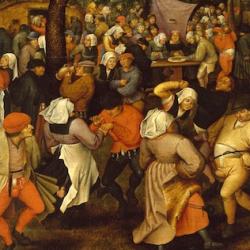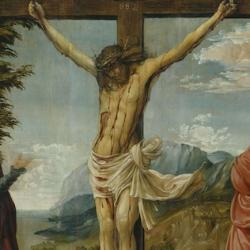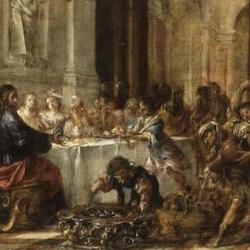In medieval iconography, John the Evangelist is depicted as an eagle, and this portrait expresses the opinion of the early church fathers, that John wrote a “spiritual” gospel which has a “loftier spiritual purpose” than the other gospels. John is the eagle because he soars “aloft to contemplate and proclaim sublime truths,” while the other gospel writers are land animals, preoccupied with the “more mundane aspects of Jesus’ ministry and person” (quotations from article by Barbara Pitkin on Calvin’s commentary on John, found in Janse and Pitkin, The Formation of Clerical and Confessional Identities in Early Modern Europe).
That assessment of John’s gospel is ancient and still very popular, but it’s highly misleading and based on a partial reading of the gospel. Far from being the work of an eagle who hovers mystically over the earth, John’s is the most contentious of the gospels. John records more arguments, and more intense arguments, and longer arguments, between Jesus and the Jews, than the other evangelists. He uses more legal terminology than in the other gospels – “witness” and “judgment” and “testimony” and “convict.” Even the word “Paraklete,” translated as “Comforter,” is a legal term.
John’s gospel is full of trials, and can be read as one very long trial scene. The Jews repeatedly bring charges against Jesus, and Jesus repeatedly turns the tables and tries them instead. It is a politically charged gospel, and no scene is more politically charged than the trial scene before Pilate, which is all about Jesus’ kingship, about power, about who is a true friend to Caesar.
Everyone has a self-interested political agenda. Pilate rules a cantankerous Jewish people, and is clearly frustrated by their stubbornness. He asks them to reconsider their attacks on Jesus, but they shout more loudly for crucifixion. To satisfy the Jews, Pilate permits his soldiers to conduct a mock coronation – crowning Jesus with thorns, putting a robe on Him, bowing before Him in mock deference. But the mockery is directed against the Jews as much as against Jesus. “Behold your king,” Pilate tells the Jews. “This is the king you deserve, you nation of rebels, you nations of losers.”
More generally, the trial scene exposes the foundational injustice of the Roman imperial system. The Roman empire expanded amidst apocalyptic hope. Now the world will be remade, Virgil wrote of Augustus; now the golden age returns. Rome brings final peace and justice to the world.
There was something to that, but in the trial of Jesus we discover the blunt injustice and bald pragmatism on which Roman peace was founded. Three times Pilate declares Jesus innocent: I find no fault in Him, I find no fault in Him, I find no fault in Him. But the Jews insist that since Jesus has made Himself a king, He threatens the Roman empire, and it’s clear from the agitation of the Jews that Jesus threatens the peace of Israel. If I don’t get rid of Jesus, Pilate reasons, I’m going to have no end of trouble from these Jews. I could lose support in Rome, and I could lose my job. It’s better for one innocent man to die than for me to be faced with enraged Jewish agitators. It’s better that one man die, than for me to lose the perks of being a provincial governor.
This is Roman peace. It is peace founded on the murder of the innocent. It’s a peace designed to protect the interests of those who hold power. It is peace from the barrel of a gun. Augustine recognized that Roman peace is a kind of peace; you can keep most people quiet if you have enough guns. But it is only a shadow of the tranquility of order that is true peace.
For their part, the Jewish leaders realize that Jesus threatens the nation – or, more precisely, their leadership of the nation. “One man must die for the people,” Caiphas said, thinking not of substitutionary atonement but of national survival. If Jesus isn’t stopped, he reasons, then the Roman army will come crashing down on us to destroy the temple and scatter our people.
In the event, we know this is ironic, because the New Testament shows that the Jews’ rejection of Jesus and the apostles is precisely what brings the Roman siege engines to Jerusalem. That irony is already evident in the trial itself. The Jews are given a choice of Jesus or Bar-abbas, Jesus or this other “Son of the Father.” They choose Bar-Abbas, and that choice expresses a political agenda. For Bar-Abbas is not a “robber” but a rebel leader, an insurrectionist, a bandit who uses his banditry to destabilize Rome. We could without much exaggeration call him a terrorist. This is the man the Jews want more than Jesus. This is the path they choose. To save themselves from the Rome, they choose a man who devoted his life to provoking Rome.
The irony turns tragic when Pilate asks them if he should crucify the Jewish king. Their answer is, “We have no king but Caesar.” This is apostasy. Israel exists as the kingdom of Yahweh, and for no other reason. And it’s foolish apostasy. The Jewish leaders have learned nothing from Israel’s long history of political idolatry. Throughout her history, Israel has longed for kings like the kings of the nations. Samuel warned them at the beginning that this desire was a death-wish, and that rejecting Yahweh as king would leave Israel to the tyrants. Every time they wanted to be like the nations, and worship the gods of the nations, Yahweh allowed it, delivering them to Midian and Moab, to the Philistines and the Assyrians, to Israelite oppressors and to Gentile oppressors. They never learned: When they choose Caesar as king, they get Caesar, and he rules with a club and a cross.
This is the political message of Good Friday: The Word of God, who was with God and was God, the Only-Begotten Son, takes flesh and dwells among us, and in response the most sophisticated religious leaders of the ancient world join forces with the most powerful political leaders of the ancient world to murder Him. God enters His creation, and His creatures concentrate all their ingenuity, passion, piety, and power to destroy Him. “Now is the judgment of this world,” Jesus had said. While the world thinks it’s passing judgment on Jesus, it is really judging itself.
Good Friday is a key moment in the political history of humanity. Jesus pulls up a rock, exposing all the corrupt priests and Pilates in their naked opportunism. In the light of Jesus’ cross, we can see the world’s backroom deals, their patriotic rhetoric and pleas for justice, their threats of war and promises of peace, for what they are – cruelty and a lust for domination.
But the political message of Good Friday is not ultimately pessimistic. Jesus does not say that power as such is corrupt, but instead speaks of a power from above. Now is the judgment of this world, but in the Roman Praetorium, the bleeding bruised Jewish prophet admits that He too is a king. Now is the judgment of this world, but in the Roman Praetorium, the King with the Crown of Thorns announces that He too has a kingdom. Now is the judgment of this world, but in the Roman Praetorium, the eternal Word speaks, proclaiming that He was born to establish a kingdom of truth, justice, and peace. Now is the judgment of this world, but when Pilate sends an innocent man to his cross, he unwittingly helps to found another kingdom, an eternal kingdom, a kingdom that is not from this world.
In the Name of the Father, and of the Son, and of the Holy Spirit. Amen.















